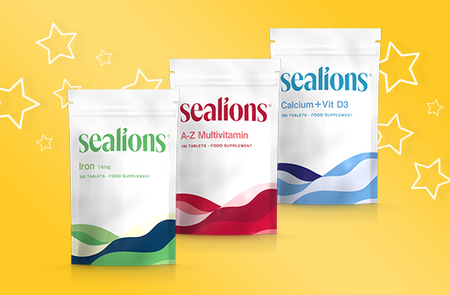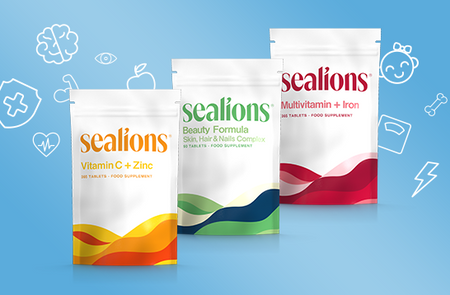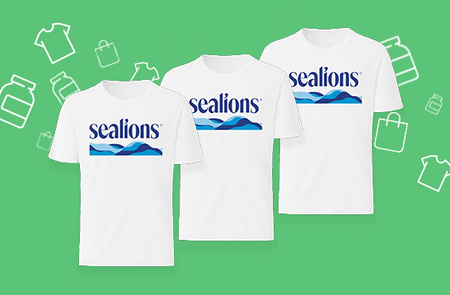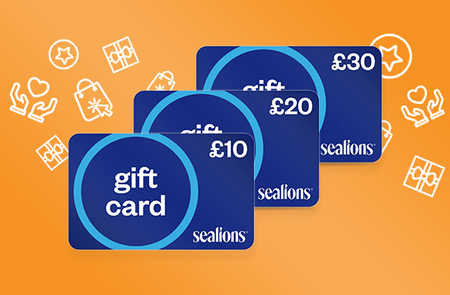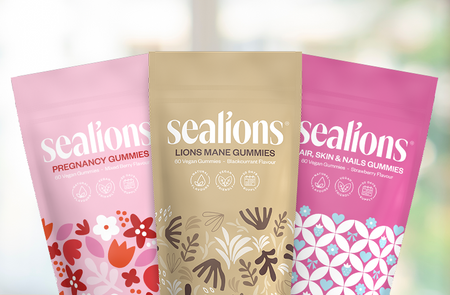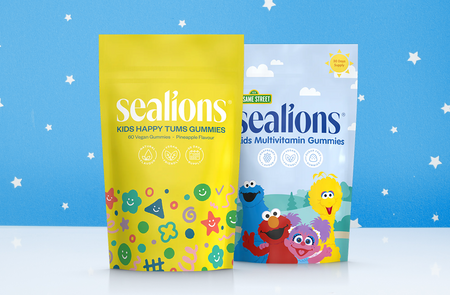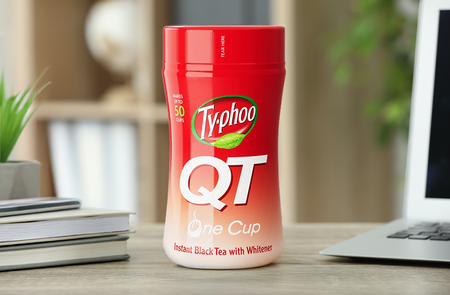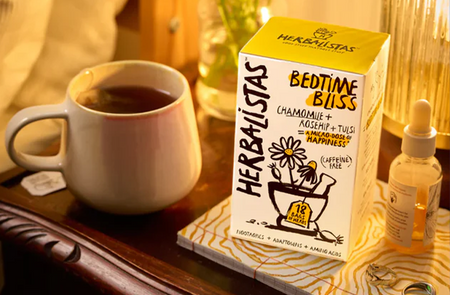
What is Biotin? Its Uses and Benefits
Biotin, also known as Vitamin B7, is an essential nutrient that helps convert fats, carbs, and proteins into fuel, and is crucial for strong hair, skin, and nails.
Because we can’t store it, daily intake from foods like eggs, nuts, and leafy greens (or reliable supplements) keeps everything running smoothly.
In this guide, we’ll break down biotin’s top health and beauty benefits, who’s most at risk for deficiency, and easy ways to boost your B7 levels.
Let’s dive in.
What is biotin?
Biotin is a B vitamin that converts food into energy. It's essentially a coenzyme that supports the metabolism of fats, carbohydrates, and proteins. As a water-soluble vitamin, your body doesn't naturally store biotin, and excess levels are excreted through your urine.
So, you'll need to get enough of it through diet alone or supplements.
Natural sources of biotin include:
- Some meats, including kidney and liver.
- Soybeans, peanuts, and other legumes.
- Whole grains.
- Fish - sardines and salmon.
- Sweet potatoes
- Bananas
- Avocado
- Dairy products
The many uses of biotin
Biotin has a variety of functions, making it one of the most important vitamins for any diet. From facilitating energy production to protecting your hair, skin, and nails, a deficiency could expose you to health issues.
Energy support
Biotin is a major contributor to metabolic processes that transform proteins, fats, and carbohydrates into energy. Its primary function is to:
- Making New Glucose: Biotin helps your body turn amino acids and other nutrients into glucose, which enhances energy.
- Producing Fats: Biotin gives enzymes the boost they need to produce fatty acids. It also helps process amino acids, including leucine.
Hair, skin, and nail health
Biotin is a popular beauty vitamin because it supports hair, skin, and nail health. You'll often find it in supplements for brittle nails, thinning hair or hair loss, and skin rashes.
Because B7 plays a role in metabolising fats and hair loss, it can significantly improve your beauty regime.
Pregnancy support
Pregnant women should ensure they get plenty of biotin during pregnancy, as it supports foetal development. Studies show that many pregnant women suffer from a mild deficiency, but introducing more biotin into your diet or taking biotin supplements can prevent this from happening (NCBI).
Low levels of biotin can impact the baby's development and expose the mother to issues like skin rash, hair loss, and brittle nails.
Nervous system support
Biotin is a B vitamin that also supports the nervous system. Deficiency can lead to a range of symptoms, including lethargy and depression. Research also suggests that individuals with a deficiency may be at risk of short-term memory loss (NIH).
Increasing your levels can support your mental health and cognitive function, making it easier to handle daily stress.
Who is most at risk of a biotin deficiency?
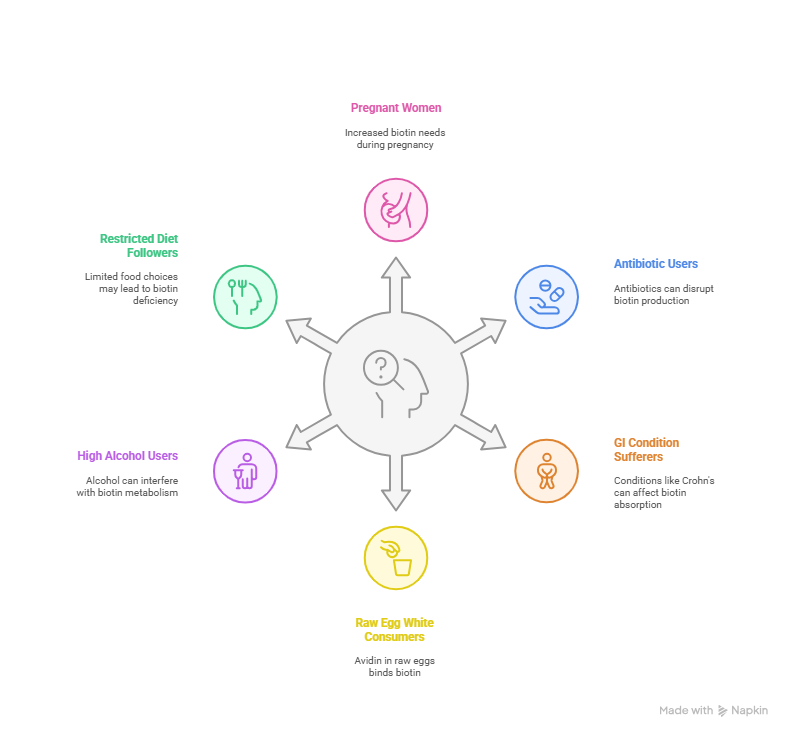
It's important to note that biotin deficiencies are rare, but certain people are more at risk of a marginal biotin deficiency. If you fall into the following groups, you may need to increase your intake:
- Pregnant women
- People who use long-term antibiotics
- Individuals with gastrointestinal conditions like ulcerative colitis and Crohn's disease
- Consuming large amounts of raw egg whites
- Long-term high alcohol use
- Vegetarians and vegans on a restricted diet
Symptoms of a B7 deficiency include:
- Brittle nails that break easily
- Thinning hair or hair loss
- Fatigue and a lack of motivation
- Tingling in the extremities
- Muscle cramps
- A rash around the nose, mouth, and eyes
- Depression and mood swings
Who might benefit from biotin supplementation?
Many people get enough biotin from diet alone, but supplements can increase levels and support their overall beauty regime. If any of the above applies, you may need more biotin to protect your overall health and ensure no negative aesthetic changes.
Dietary supplements are great ways to increase your biotin intake - especially if you have a pre-existing condition, require long-term antibiotics, or have dietary restrictions due to lifestyle choices or gastrointestinal disorders.
Sealions Hair, Skin & Nail Gummies
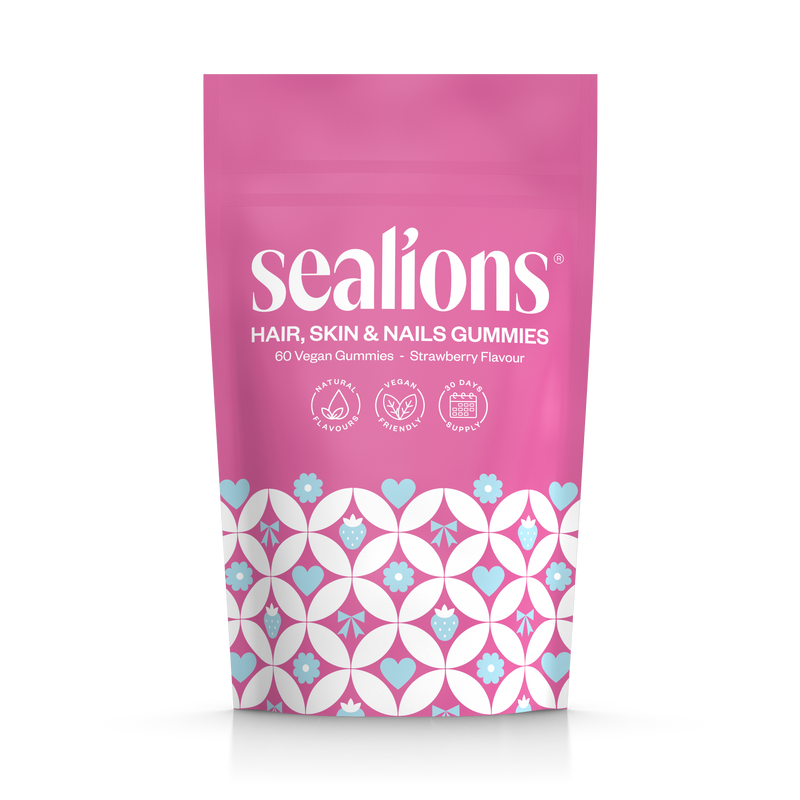
At Sealions, we pride ourselves on creating high-quality vitamin supplements at low prices. Our customers can access significant savings while focusing on their overall health and well-being.
The Hair, Skin, & Nail Gummies cost just £7.00 for a 30-day supply and contain optimal amounts of:
- Biotin
- Vitamin A
- Vitamin C
- Vitamin D3
- Vitamin B6
- Zinc
- Selenium
Plus, they have a natural strawberry flavour. When you take the recommended dose of two gummies daily, you can expect thicker hair, stronger nails, and clearer skin.
Shop Sealions Hair, Skin & Nails Gummies
The bottom line
Make no mistake—biotin is an essential nutrient that supports everything from biological processes to aesthetics. While rare, even a mild biotin deficiency can lead to a variety of side effects, but adjusting your diet or taking biotin supplements can boost your well-being.
Sealions is here for all your needs if you're looking for high-quality supplements. Stock up today and enjoy savings you won't find elsewhere. Need some advice? Our experts are here to answer your questions, so please get in touch with us today.
FAQs
How much biotin do I need?
There aren't any set Recommended Daily Allowance guidelines for biotin intake, but specialists generally agree on the following guidelines:
- Adults: 30–100 micrograms (mcg) daily
- Pregnant Women: 30 mcg daily
- Breastfeeding Women: 35 mcg daily
Because biotin is considered safe - even at high doses - there aren't any upper limits. However, you should only take what you need.
Which other dietary supplements should I combine biotin with?
Biotin is most effective when combined with other essential vitamins and minerals. So, if you're considering using biotin supplements, we recommend pairing them with the following vitamins and minerals:
- Vitamin B5: Pantothenic acid is another popular supplement that turns food sources into energy and offers beauty benefits. You'll often find it in Vitamin B-Complex supplements.
- Vitamin C: Most people understand the importance of adequate Vitamin C. After all, it's a powerhouse antioxidant.
- Vitamin E: Vitamin E protects cells from oxidative stress, strengthening the immune system.
- Collagen: Collagen is a vital supplement while ageing, making up 30% of your body's protein content. It contributes to healthy hair, skin, and nails while also offering a range of other benefits.
When should you avoid using biotin supplements?
While biotin is generally safe, there may be some circumstances where you should avoid it. For example, people with thyroid issues are more at risk of biotin interference during blood tests, which makes it hard for medical professionals to determine the best treatment options.
Biotin metabolism may also interact with some medications - especially antibiotics and anticonvulsant treatments, so it's important to seek medical advice before using it.
What happens when you start taking biotin?
As with all supplements, biotin doesn't offer instant results. When you start taking it, you'll typically notice improvements within a few weeks - although it can take months to see the full effects. Consistency is key, so keep up with the supplementation, and you will notice a difference.
Is biotin good for belly fat?
While biotin can support your metabolism by converting macronutrients into energy, there's no evidence that it leads to fat loss. Instead, you should focus on a balanced diet and getting plenty of exercise.
If you're hoping to achieve weight loss, Sealions has a variety of weight management products available, including protein powders, meal replacement shakes, and fat metabolisers.
Does biotin do anything for hair growth?
Biotin can help you maintain healthy hair, with deficiencies often leading to thinning and loss. It's not a hair growth supplement, but if you're prone to breakage and thinning, biotin can strengthen your hair, which will indirectly promote healthy hair growth.
Is it safe to take biotin every day?
Yes, most people are fine to take biotin every day without experiencing any issues. However, if you're using medication or have a pre-existing condition, taking too much biotin could impact your symptoms and interact with the medications you're currently taking.
Tagged:

